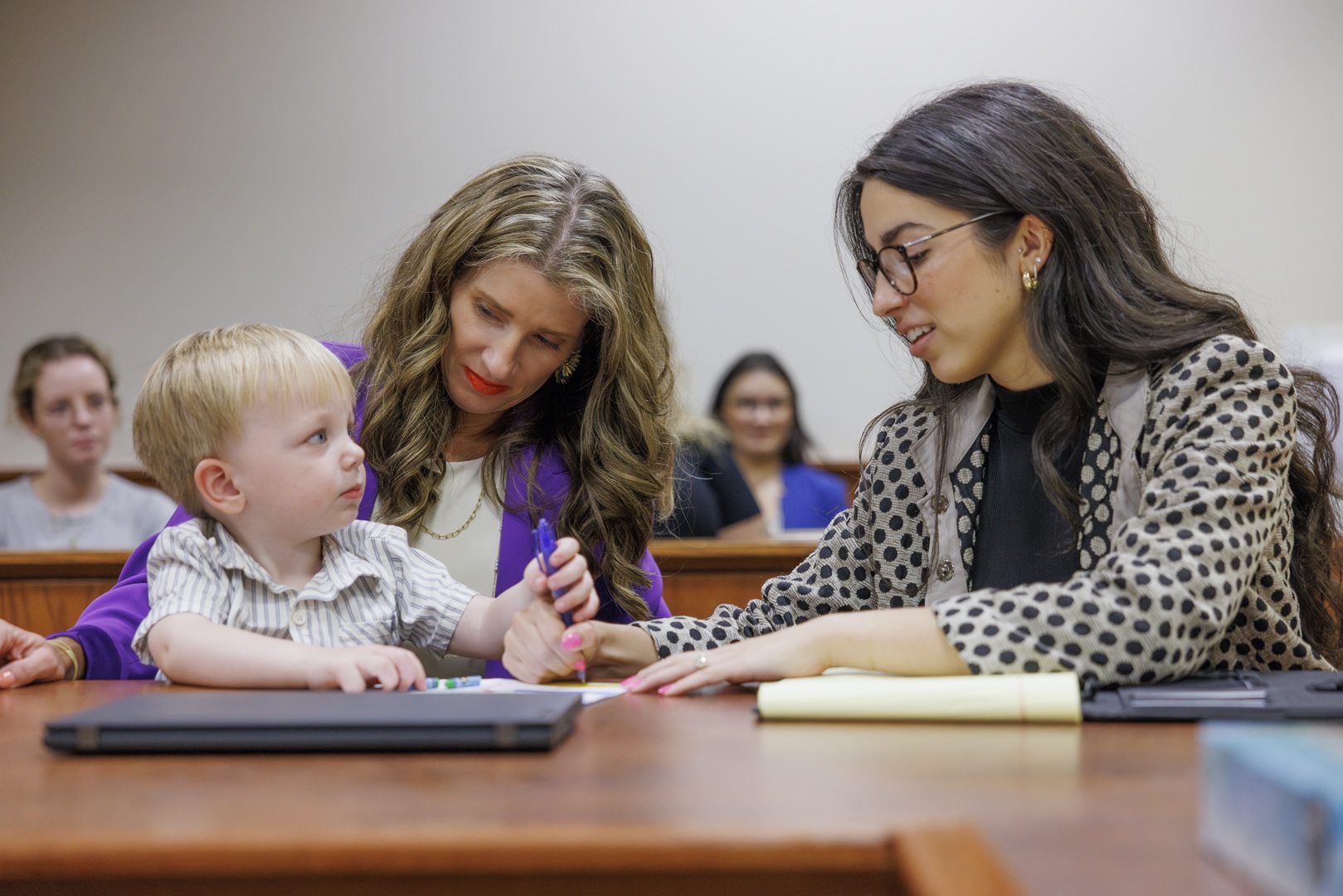The Children’s Justice Clinic (CJC) is the cornerstone clinical program of the Nebraska Children’s Justice and Legal Advocacy Center (NCJC), launched in 2017 through a partnership with the University of Nebraska College of Law and the Center on Children, Families, and the Law. The Clinic prepares law students to serve as Guardians ad Litem for children involved in abuse and neglect proceedings in Lancaster County Juvenile Court.
Under the supervision of Assistant Professor Michelle Paxton—and with support from NCJC’s reflective practice and legal support professionals—students represent real clients from day one. The CJC offers a unique, fully integrated experience where students gain not only courtroom and case management skills, but also the emotional insight and trauma-informed perspective needed to advocate effectively for vulnerable children and families.
“The Children’s Justice Clinic gave me more than just courtroom experience—it offered the mentorship, structure, and sense of purpose that shaped how I show up as an advocate. Arguing on behalf of children, with that kind of foundation behind me, was truly transformative. Without that experience, I wouldn’t be the advocate I am today.”
Tyrone Fahie
CJC Student 2023-2024
What Makes the Clinic Different
Students in the Children’s Justice Clinic participate in a comprehensive, two-semester experience that combines intensive legal training with direct client representation and structured reflective support. Key components include:
Foundations Training: A pre-semester intensive covering child development, trauma, courtroom advocacy, federal and state child welfare law, and the ethical responsibilities of child representation.
Weekly Seminars: Deepening students’ understanding of complex legal, procedural, and social issues in juvenile court.
Client Representation: As senior-certified law students, participants take the lead on their cases and serve as Guardians ad Litem under close, individualized supervision. This model allows students to truly own their cases while receiving continuous guidance to develop their advocacy skills and professional judgment.
Multidisciplinary Case Consultation: Students benefit from tailored guidance throughout the semester, drawing on the diverse expertise of NCJC faculty and consultants in law, mental health, and child welfare. This collaborative support helps students navigate complex case issues with confidence and clarity.
Reflective Practice: Students participate in regular reflective sessions designed to build resilience, promote self-awareness, and support long-term professional sustainability.
Legal Practice Support: NCJC’s paralegal provides essential behind-the-scenes guidance, helping students learn to manage their cases efficiently, draft professional-quality filings, and build habits that support strong legal practice from day one.
Client Visits & Court Appearances: Students conduct client visits and attend court hearings with consistent support from faculty and staff, allowing for meaningful engagement, guided observation, and real-time learning at every step of the process.

Why It Matters
Children in the child welfare system face profound challenges, from instability and trauma to complex family dynamics. Through their work in the CJC, students give children a voice in court—ensuring that their needs, experiences, and best interests are heard and represented. CJC students are equipped to meet these challenges with skill, compassion, and a deep understanding of what quality advocacy looks like in practice. By the end of the CJC, students graduate ready to lead in child welfare law or any setting where trauma-informed, client-centered advocacy is essential.
“My time in the Children's Justice Clinic was one of the most meaningful parts of law school. I gained practical skills that strengthened my ability to advocate both in the courtroom and in working with clients and professionals. It prepared me to enter practice with confidence and reaffirmed my commitment to serving others.”
Abigail B.
CJC Student 2024-2025
A Clinic Experience Like No Other
What sets the Children’s Justice Clinic apart is its commitment to whole-attorney development. From the first home visit to the final court hearing, students are never alone—they are part of a collaborative, supportive team that blends legal excellence with trauma-informed care. Whether you plan to work in child welfare, public interest, or family law, CJC provides unmatched preparation for impactful, purpose-driven legal practice.
Throughout the Clinic, students are supported by the full NCJC team—including faculty, mental health and reflective practice professionals, legal support staff, and case consultants—who work together to create a collaborative, enriching clinical experience. Whether it’s reviewing filings, joining client visits, or offering space for reflection, each team member contributes to the growth and development of future child welfare advocates.
“The GAL is critical in a juvenile court case. In Lancaster County, we need more attorneys not only willing to serve as a GAL, but able to implement best practices to effectively advocate for children. Advocating for very young children presents a unique challenge that requires a special skill set.”
Judge Roger Heideman
Presiding Judge, Separate Juvenile Court
Lancaster County
How to Get Involved
Enrollment in the Children’s Justice Clinic is limited to third-year law students at the University of Nebraska College of Law who have obtained senior certification. This two-semester clinic offers a rigorous, hands-on experience for students who are passionate about child advocacy and ready to take the lead on real cases.
Completion of the Juvenile Law course is strongly recommended, and Legal Profession is required prior to or concurrent with clinic enrollment. Students apply through the College of Law’s clinical application process held each spring.
NCJC also offers the Children’s Justice Clerkship Program for second-year law students—a unique opportunity to contribute to meaningful child advocacy work before entering clinic. Clerks join the NCJC team in supporting rural attorneys and advancing the legal representation of children and families across Nebraska. In this paid position, clerks conduct targeted legal research, draft written materials, and help solve real problems faced by attorneys serving in Nebraska’s most underserved communities. This program offers students a powerful way to deepen their understanding of juvenile law, build relationships with practicing attorneys, and play an integral role in expanding access to justice statewide.
To learn more about how to apply or get involved, contact cjc@unl.edu.
